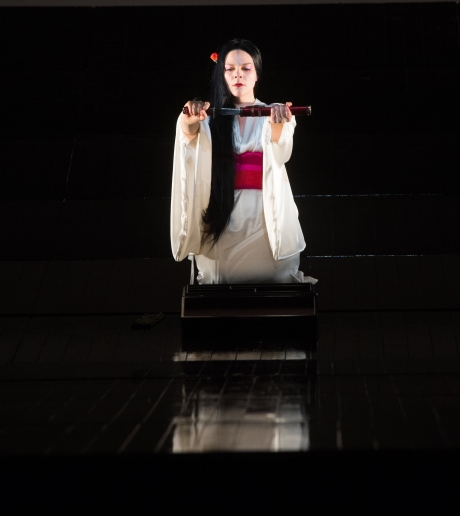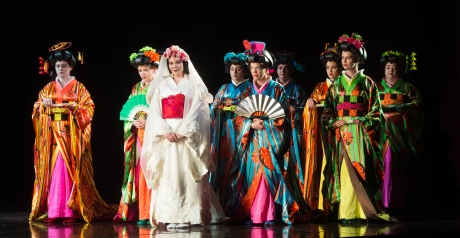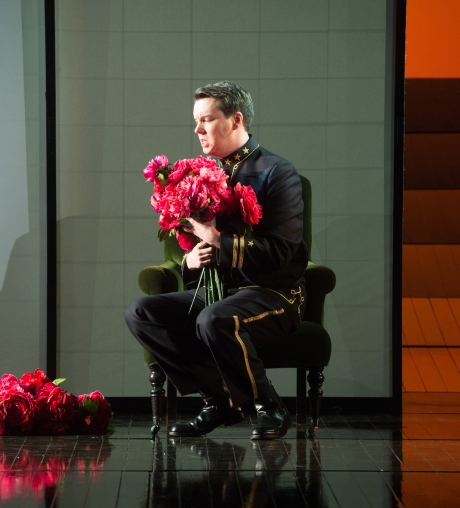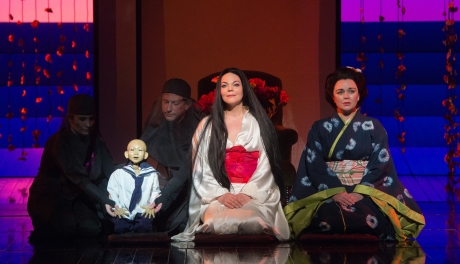Anthony Minghella’s gorgeous Madam Butterfly for ENO is a favourite of London audiences, and it is not hard to see why. The stage is a sea of visual brilliancy from the first scene to the last, awash in Han Feng’s sumptuous costumes, Peter Mumford’s evocative lighting, Michael Levine’s ingeniously adaptable set design, and the graceful choreography of Carolyn Choa. It still looks ravishing even in its sixth revival; if anything, its colours seem more vibrant, its style more opulent than ever before. Sarah Tipple returns for the third time to direct the revival, and it moves with assurance and flair, the allure of Puccini’s Japan evoked with some of the most striking set pieces one is likely to view on any London stage.

If one could quibble over such impressive polish, there are moments when it feels something in the production’s stylistic perfection misses the heart of Puccini’s opera. It presents a view of Japan as the caddish Pinkerton would see it—exotic and alluring and altogether unreal, peopled by lacquer dolls to be admired for their beauty and quaint charm and then discarded at the end of the night. Still, the beauty of the staging is worth experiencing; with strong musical accompaniment, it is magic. The current revival is rather mixed on this front, offering up the visceral tragedy at the opera’s core, yet missing some of its nuance and poignancy.
The most prominent cause of this was an audible disconnect between the orchestra and the stage. Sir Richard Armstrong, former music director of Welsh National Opera and Scottish Opera, roused the ENO Orchestra through the opening bars of the score with momentum and accomplished technical skill. Unfortunately, though the orchestra sounded superb, too often during the performance the conducting was not well coordinated with the singers on stage. The result of this was that the orchestral playing, though of a high quality, frequently threatened to overwhelm the singers. This seemed especially pronounced early in the evening, with the final act somewhat more settled. With luck, this will lessen as the run progresses. On opening night, unfortunately, it notably detracted from the performance.

The singers were made to struggle to be heard over the orchestra, those in the audience made to struggle to hear the words being sung. This was unfortunate in a theatre taking the trouble to sing in English, yet there were nonetheless some standouts in the cast. Perhaps most impressive was David Butt Philip in his role debut as the dishonourable Pinkerton, the American soldier who thoughtlessly takes a young Japanese bride and then abandons her. His voice was bright and attractive, and he infused his time on stage with youthful ardour, singing ‘Dovunque al modo’ with charisma and proving more likeable than most exponents of this generally unsympathetic role. Though he sometimes struggled to fill the Coliseum against the weight of the orchestra, he carried his performance with charm and vocal poise. One saw his genuine regret upon realising the tragedy he had caused, rendering the opera’s close all the more heartbreaking.
Another highlight was George von Bergen, reprising his role as the American consul Sharpless. Unlike his brasher compatriot, Sharpless is deeply humane, the one truly sympathetic male character in the opera. Mr. von Bergen brought kindness and dignity to the role, and some lyrical singing, too; his opening scenes with Mr. Butt Philip were a pleasure. The scene in Act II where he endeavours to read a letter from the re-married Pinkerton to Butterfly but ultimately finds himself unable to shatter her illusions was incredibly moving, driving home with eloquence the inevitable misery to come.

Rena Harms returned to the Coliseum as Butterfly following her 2011 debut as Amelia in Simon Boccanegra. At her best, Ms. Harms was incredibly moving; a vivid actress, she painted the depths of Cio-Cio-San’s despair with an almost unwatchable immediacy. There is real power to her steely soprano, and she was capable of cutting over the orchestra during her long love duet with Pinkerton at the end of Act I. Unfortunately, when stretched, there was a stridence in her upper register that was less appealing. It was ill-suited to the crystalline tones one more often associates with the role, and meant that she struggled to capture Cio-Cio-San’s naivety and youth. Nevertheless, she sang a potent ‘Un bel dì’ that couldn’t help but move, and her final scene was almost unbearably heartbreaking.
Stephanie Windsor-Lewis was quietly affecting as Butterfly’s faithful maid Suzuki and Matthew Durkan was excellent as Prince Yamadori, a regal presence in red and gold. As ever, one could not help wishing Cio-Cio-San could choose a different ending for herself by accepting Yamadori’s offer of marriage instead of moving headlong toward the opera’s tragic conclusion. Alan Rhys-Jenkins made the most of the unctuous Goro, and Mark Richardson was intimidating as the Bonze, Cio-Cio-San’s uncle who disowns her for rejecting her religion in favour of the ‘American God’ of her husband.

Abandoned by both family and love and yet somehow retaining personal nobility in spite of all, Cio-Cio-San’s fall is one of the most difficult things to watch in a genre replete with horrific endings. The alarming ease with which an American solider enters into a casual entanglement with a fifteen year old girl who earnestly believes love lasts forever, the devastating realisation that the affair has left her with child and an outcast from her own culture, the seizing of that child, her one true hold on life and love, from her maternal embrace; the themes at the heart of Madam Butterfly are not easy to take, even for a twenty-first century audience.
Does one do them justice by glossing over such inhumanity with sheer scenic beauty? In Mr. Minghella’s production, adroit puppetry carries paper cranes through the sky, cherry blossoms bedeck the stage as paper lanterns and sliding panels evoke the Japan of Butterfly and Pinkerton’s incipient love. It is incredibly beautiful, and in some ways makes the tragedy all the more conspicuous for its intrusion. The decision to force a second interval in after the Humming Chorus is poorly-judged, interrupting the narrative flow, so engaging as it is by that point in the show. Yet other touches—the Japanese fan dance that opens the performance in a stylised tableaux of crimson and black, the artful puppetry inspired by Japanese Bunraku theatre—are of a remarkably creative type that one will not soon forget. I have always felt the impact of Sorrow, the child Butterfly has had with Pinkerton, would be more pronounced were the child of flesh and blood rather than string and wood. Yet one cannot deny the imagination of the concept, or the skill in its execution by Blind Summit Theatre.
Despite any flaws along the way, the evening moved through the last act toward its conclusion with a sense of purpose and insuperable fate. It is here that the production really comes into its own; even if earlier moments had not always attained the poignancy one might have hoped, Ms. Harms and Ms. Windsor-Lewis were superb in the final scene, driving home Cio-Cio-San’s tragedy with the full measure of its sorrow.
3 stars
John E.de Wald
(Photos by Tom Bowles)